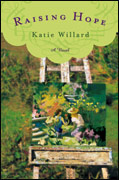Another
Column at MyShelf.Com
|
||||||||||
| Beneath the Covers,Past |
||||||||||
| An interview with author Katie Willard
Katie: I am a stay-at-home mom of an eight-year-old girl. The three of us (my husband, myself and my daughter) live just outside of Boston. I love spending time with my family and friends, reading, writing and gardening.
Lynda: How long have you been writing? Katie: I have written on and off (mostly off!) since childhood. When my daughter went to school full-time, I had the time and emotional space to pursue writing more seriously. When I began writing in earnest, my goal was simply to explore the craft. I didn’t set out to write a novel, but when the “puzzle pieces” I was working on seemed to fit together in a novelistic way, my goal became finishing the project. Becoming published was (and still is!) a bit of a shock!
Lynda: I thoroughly enjoyed Raising Hope. How do you perceive this story? Katie: Thank you! I’m delighted that you enjoyed my novel. You know, I see this story as a story about ordinary women trying to live their lives the best they know how. I’m fascinated by and I have a deep respect for ordinary, average people. We humans are so brave as we grow and change and adapt to everything life throws at us. I wanted to celebrate that bravery in Raising Hope.
Lynda: Did anything in particular inspire this novel? Katie: Only my characters. When I write, I start with the characters. A glimmer of a character – a certain point of view or situation or personality trait – will come into my brain, and I’ll mull it over, coaxing out other facets of the character. Then I’ll get to know the other people in the character’s life. Once the characters come alive for me, I start to flesh out what their “story” is.
Katie: Sara Lynn and I are ex-lawyers and avid gardeners. I'm not as risk-averse as she is, nor as stuffy. Ruth is a truth-teller - she sees people and situations as they are, often in a humorous way. My interior monologue is similar to Ruth's - I'm often noticing how funny life and people are.
Lynda: You have stated that you write dialogue by inhabiting the character, much the way an actor adapts to a role. Have you ever had difficulty shedding a persona? Katie: No, I don't have trouble shedding persona, probably because the second my daughter walks through the door, I come back into my own life with a crash! I feel very fortunate that I can live in my real life, and also explore other lives as well.
Lynda: One more writing question. Raising Hope is written entirely first person. Why? Will the next novel use the same technique? Katie: I enjoy writing in the first person because it's
the most direct way to "become" the narrator of the story.
My current novel-in-progress is written in the third person, mostly
because I wanted the challenge of doing something different, but
also because third person allows my to relate things about each
character that they themselves are not aware
Lynda: Which writing facets do you enjoy most? Which are most troublesome? Katie: I like inhabiting other people and other situations. I also enjoy delving into and attempting to make sense of the complexities of relationships. As for troublesome facets, I am constantly talking myself through the fear of having nothing to say or of not being able to achieve my vision on the page. I have a bunch of inspirational quotes up on my bulletin board above my computer to help with this fear, my favorite being a John Wayne quote that reads, "Courage is being scared to death - and saddling up anyway."
Lynda: Beyond the female interactions lie the undercurrents of two sweet romances. Why did you choose to leave the readers out of the bedroom? Katie: Oh, you should speak with my mother! She believes I took readers a little too close to the bedroom for her comfort level! I knew sex was going to important as the book came together, especially in the case of Sara Lynn, whose repression has a lot to do with her attitudes and experiences surrounding sex. Ruth, too, has had a sexual experience that made her particularly fearful of romantic connection. And Hope is twelve – she starting to think about this stuff quite a lot! The book would not have been as true to the characters had it omitted the sex scenes. However, I didn’t see a need to write these scenes graphically, as explicit scenes would not have given the reader any further insight into the characters or the story.
Lynda: After reading Raising Hope, I had a difficult time deciding in which category to place this novel. How do you define and separate romance, chicklit and women’s literature? Katie: I certainly don’t have any expertise, but I’ll tell you how I define them personally when I’m in a bookstore feeding my reading habit! For me, romances are candy – and who doesn’t like candy? You don’t necessarily want a steady diet of it, but it is so sweet and yummy once in a while. Women’s literature is the hearty soup of the book world – it sticks to your ribs and nourishes you. Chicklit is a green salad with a zesty dressing – not as filling as the soup, but still a nice meal in its own right. Sometimes you want soup; sometimes you’re in the mood for a salad; and sometimes your sweet tooth demands candy. I don’t understand some commentators’ snobbery about chicklit and romance. There’s room on the shelves for all kinds of books to satisfy everyone’s tastes.
Lynda: Under what genre and subgenre would you classify your work? Katie: I would classify Raising Hope as “women’s fiction” because it is concerned with and celebrates female characters.
Lynda: Do you have any advice for novice writers? Katie: Write to please yourself, and write because it makes you happy! Also, don’t get discouraged when you get stuck. We all go through periods of wanting to chuck our current project and start something new. Don’t do it! Make a commitment to yourself to finish the work.
Lynda: I see Raising Hope as a younger, New England version
of Steel Magnolias. Katie: Raising Hope as a younger, New England version of Steel Magnolias - I love it! I don't know that I'm far enough along in my new book to come up with a great description for it. It's set in New England, and it's a very internal book - lots of exploration of the interiors of these characters. More about mothers and daughters, about marriage, and about how to live with the sometimes great losses we experience. I don't have a title yet, nor a pub date. I've been doing a lot of thinking and a little writing this summer, but I'm going to be writing with intensity as soon as school starts.
Lynda: You have already made several personal appearances. Are more planned? Did you have any memorable experiences during these events? Katie: No more personal appearances, as I just finished my tour this past weekend. I really enjoyed meeting booksellers and readers. I especially loved talking with readers who really connected with Raising Hope, and were kind enough to share their personal experiences with me.
Lynda: Thank you for sharing your time and thoughts with us, Katie. Getting to know you has been a pleasure. Readers, if you’d like to know more about Katie Willard, please visit her website at www.katiewillard.com .
© MyShelf.Com. All Rights Reserved. |
||||||||||
 Literature
that targets women has come a long way. Gone are the days of bodice
rippers. (Can I hear an amen?) In their stead, publishers now offer
romances, chicklit and women’s literature. No matter which
subgenre a novel falls into, readers meet stronger, more determined
females who embrace their sexuality while coping with life’s
demands. A recently published book, Raising Hope,
clearly illustrates the best of all three female-targeted subgenres,
and it was my joy to interview author Katie Willard.
Literature
that targets women has come a long way. Gone are the days of bodice
rippers. (Can I hear an amen?) In their stead, publishers now offer
romances, chicklit and women’s literature. No matter which
subgenre a novel falls into, readers meet stronger, more determined
females who embrace their sexuality while coping with life’s
demands. A recently published book, Raising Hope,
clearly illustrates the best of all three female-targeted subgenres,
and it was my joy to interview author Katie Willard. 